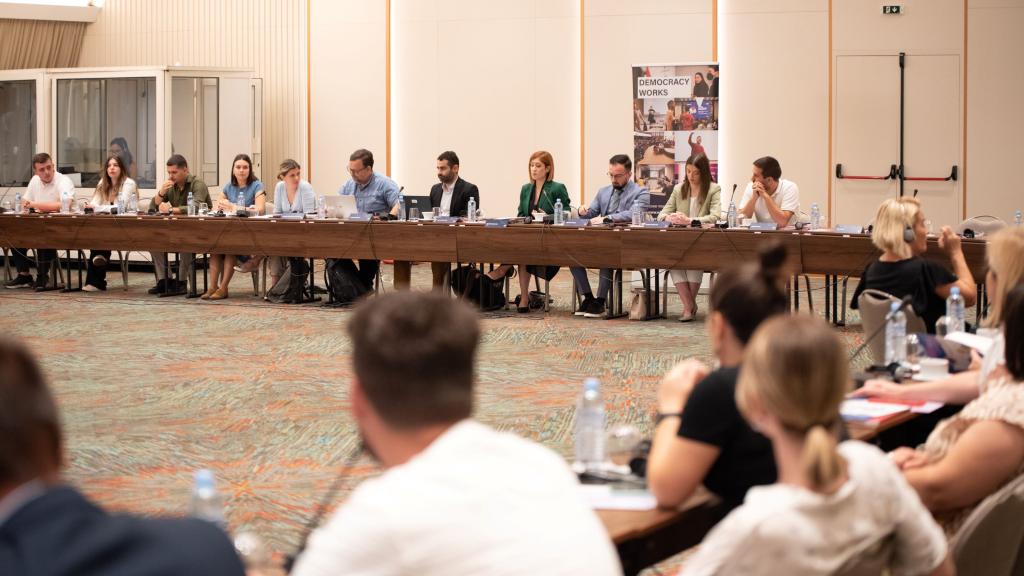Supporting CSOs to engage with parliament in Macedonia

“I know very well the problems that people with disabilities and their families face” Blagica Dimitrovska from civil society organisation (CSO) “Inkluziva” explained: “as I am one of them.”
Ms Dimitrovska is President at the Association for promotion and development of inclusive society – Inkluziva from Kumanovo, Macedonia, one of the 12 civil society organisations that the Westminster Foundation for Democracy is currently supporting through an EU funded project. By providing the CSOs with the skills they need to effectively lobby parliament for change we hope to bring real benefits to citizens lives in Macedonia.
“Many times, I’ve been trying to initiate a meeting with state institutions, and I’ve raised this issue at many public events. However, there was no progress” Ms Dimitrovska explained her previous experience trying to support disabled people, before Inkluzia were involved in the project. “But now, when I have this public policy paper in my hands, I will advocate for the rights of this target group much more strongly, and I strongly believe that there will be legislative changes soon” she said.
Inkluzia’s mission is to create conditions for an inclusive society through activities and projects that will improve the lives of people with disabilities and the families who support them.
Since May 2016, WFD organised training, panel discussions and mentoring on the best methods to engage with parliament. The most recent session tackled the skills needed to plan, research and write a policy paper and present the findings to the parliament. The “learning by doing” approach was applied with the organisations having a mentor to support with conducting research and writing their policy paper.
“What helped us the most was the direct work on the document with mentor support” says Biljana Dukovska, President at the Macedonian Anti-Poverty Platform, a national platform of CSOs that work to reduce poverty and foster social inclusion. “The trainings provided great theoretical basis, but we could never imagine how big this process actually is, until we started to implement research and translate the findings into a policy paper on our own” she continued.
Having direct support and someone to answer your questions Ms Dukovska found very helpful. “It is good to know that there is someone to ask when you face a difficulty, and for that we had the hand-outs and the mentor at any given moment” she said. Through the collection of life stories about people living in poverty, the Macedonian Anti-Poverty Platform’s policy paper points out inadequacies with the current social financial assistance in Macedonia that keeps people poor and excluded. They propose changes to the system that would influence poverty prevention and reduction.
This project supports CSOs covering a range of pressing human rights issues from social policy and health care issues, to discrimination in higher education and sanctions against hate speech. All 12 CSOs have improved the presentation of their research findings to a manner that an MP would find the most useful to initiate a debate in the Parliament. The ability of CSOs to conduct research and influence the debate in the Parliament will help improve citizen’s human rights in Macedonia, with legislative change being the ultimate goal of WFD’s support. “Prior to our participation in this project, we had a lot of topics and data that were promoted only through the media. Now we can translate that data into policy. Now we know how to plan a research and structure a policy” explains Ms Dukovska.
It’s not just the 12 participating CSOs that will benefit from the project, either. WFD will make all policy papers available to all MPs, thus support the CSOs’ access to the Parliament where they will be able to advocate for the proposed changes in the documents on their own. MPs will also benefit from this process, since they will be provided with relevant and in-depth information and analysis on the existing legislative and evidence-based suggestions for law changes.
WFD’s ambition is for these CSOs to be standard-bearers for a new way of engaging with parliament; successful results for these initiatives will encourage others to adopt the same practices. That can only make Macedonia’s democracy stronger. Doing so will help the effectiveness of the parliament in its efforts to achieve better policy on human rights issues. It will also improve representation of the marginalised groups of citizens set to benefit – both important ingredients in making Macedonia’s governance more inclusive and effective



